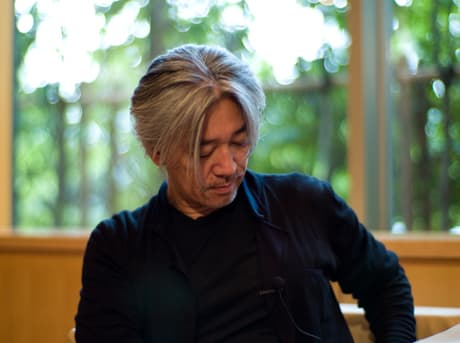Japanese composer Ryuichi Sakamoto has announced that he's been diagnosed with throat cancer, and has cancelled all upcoming appearances and activities to undertake treatment. The news was delivered by the musician in a statement, where he confirmed he learned about his diagnosis late last month. Sakamoto is suffering from oropharyngeal cancer.
"After much thought and consideration, I have decided to take time off of work in order to concentrate on treating it," he said. "I deeply regret causing so many people considerable inconvenience. However, the first wealth is health, and hence this bitter decision."
Sakamoto is the guest director of Japan's Sapporo International Art Festival 2014, which starts July 19 and runs until September. The musician noted that he had put two years of work into the festival and that the programming is of the highest quality, but he will not be attending.
"I would like for nothing more than for everyone to enjoy the festival in my place," he said.
Additionally, Sakamoto has cancelled a July 30 concert in Tokyo that would have seen the debut of a new piece titled Timeless. The sold-out performance would have also seen the pianist performing with cellist Jaques Morelenbaum, violinist Judy Kang, and vocalist Paula Morelenbaum.
It's unclear at which stage Sakamoto's cancer is in, though the Oscar winner noted that he's planning on returning "after a full recovery." Likewise, a statement from his management company Avex Music Creative said Sakamoto plans to "dedicate all his time to treatment."
Sakamoto made an impact in the late '70s as the keyboardist of early electro-pop group Yellow Magic Orchestra, but worked outside of the band via solo LPs and composition work. He won an Oscar in 1987 for his score to The Last Emperor, has collaborated with Christian Fennesz for a pair of albums and an EP, and has delivered a number of albums on his own over the years. His most recent was 2013's Three.
Outside of his recorded output, the composer was named "Officier des Ordre des Arts et des Lettres" by the French government in 2009, has been politically active as a vocal detractor of nuclear power, and had been part of a fight to repeal legislation preventing people from dancing at Japanese nightclubs.
"After much thought and consideration, I have decided to take time off of work in order to concentrate on treating it," he said. "I deeply regret causing so many people considerable inconvenience. However, the first wealth is health, and hence this bitter decision."
Sakamoto is the guest director of Japan's Sapporo International Art Festival 2014, which starts July 19 and runs until September. The musician noted that he had put two years of work into the festival and that the programming is of the highest quality, but he will not be attending.
"I would like for nothing more than for everyone to enjoy the festival in my place," he said.
Additionally, Sakamoto has cancelled a July 30 concert in Tokyo that would have seen the debut of a new piece titled Timeless. The sold-out performance would have also seen the pianist performing with cellist Jaques Morelenbaum, violinist Judy Kang, and vocalist Paula Morelenbaum.
It's unclear at which stage Sakamoto's cancer is in, though the Oscar winner noted that he's planning on returning "after a full recovery." Likewise, a statement from his management company Avex Music Creative said Sakamoto plans to "dedicate all his time to treatment."
Sakamoto made an impact in the late '70s as the keyboardist of early electro-pop group Yellow Magic Orchestra, but worked outside of the band via solo LPs and composition work. He won an Oscar in 1987 for his score to The Last Emperor, has collaborated with Christian Fennesz for a pair of albums and an EP, and has delivered a number of albums on his own over the years. His most recent was 2013's Three.
Outside of his recorded output, the composer was named "Officier des Ordre des Arts et des Lettres" by the French government in 2009, has been politically active as a vocal detractor of nuclear power, and had been part of a fight to repeal legislation preventing people from dancing at Japanese nightclubs.




